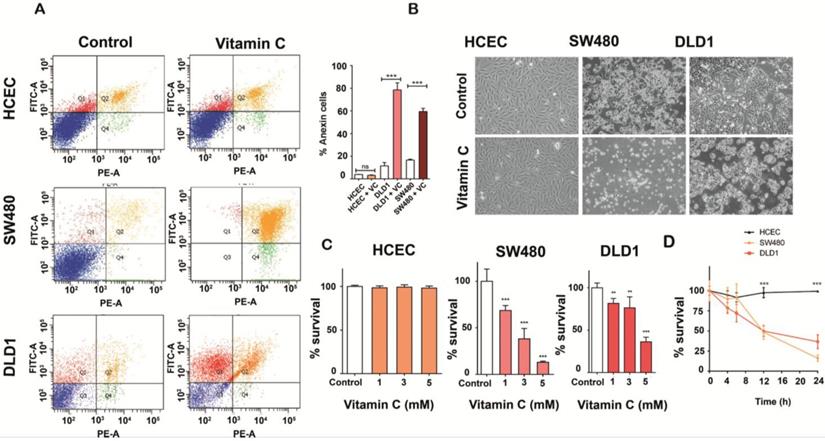Significant advances in the effectiveness of vitamin C to treat persistent cancers
UCAM and Fundación Jiménez Díaz develop a project led by Dr. Óscar Aguilera that provides important results regarding the use of Vitamin C in the treatment of tumours resistant to chemotherapy.
The prestigious scientific journal ‘Theranostics’ has published the first results of the research developed by UCAM Universidad Católica de Murcia and Fundación Jiménez Díaz, which is carried out by a team of scientists led by Dr. Óscar Aguilera, senior researcher of the Transnational Oncology Department of the Foundation, led by Dr. Jesús García Foncillas. The study, which is being developed (currently, they are working with animal models), reveals, in its first results, that vitamin C is a potential therapeutic agent to treat certain tumours - hypoxic ones, with KRAS mutation - that are resistant to chemotherapy and have poor prognosis, such as some types of colorectal cancers.
The project is very interesting both for biomedical researchers and for oncologists, as well as for the specialised health workers who are involved in the diagnosis and the clinical management of cancer.

Hope for the sick
“These results reopen the scientific debate regarding the potential therapeutic use of vitamin C, which is water-soluble and frequently present in nature, for treating cancer, and they offer a hope to oncological patients affected by tumours that are resistant to conventional therapies by making them a lot more sensitive to chemotherapy, which would significantly increase their life expectancy”, explains Dr. Aguilera, Marie Curie Fellowship post-doctoral researcher, who had already published before, in ‘Oncotarget’, a study titled “Vitamin C uncouples the Warburg metabolic switch in KRAS mutant colon cancer”.
The research revealed that the use of megadosis of Vitamin C has almost no serious side effects at all, “which invites us to carry out clinical trials with patients in order to use it in combination with different pharmaceutical molecules of interest”, points out Dr. Aguilera.
Background
The researchers point out, with regard to colorectal cancer with a KRAS gene mutation, that in between 30% and 50% of cases, the patients’ therapeutic options are extremely limited. Unfortunately, the new therapies addressed to KRAS tumours have failed in clinical trials, therefore it is considered as a protein that is impossible to pharmacologically attack, and such tumours have a poor prognosis. “The mutation of the KRAS gene is associated to an aberrant metabolic transformation that entails the activation of the hypoxic ways and the reprogramming of metabolism to obtain energy fast and make the tumour grow, which makes the tumour very resistant to conventional chemotherapy and anti-EGFR biological therapies”, says the main researcher of the study, Óscar Aguilera. Vitamin C, he adds, is able to inhibit those hypoxic ways and to reverse the metabolism of the tumour, bringing the tumour cells towards an almost normal metabolism through which they are unable to obtain energy, which causes them to have an energy collapse and die.
Complete article
Vitamin C activates pyruvate dehydrogenase (PDH) targeting the mitochondrial tricarboxylic acid (TCA) cycle in hypoxic KRAS mutant colon cancer




